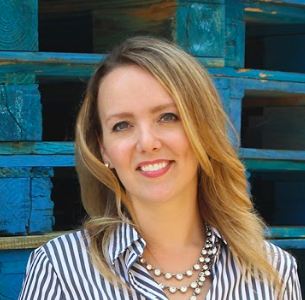
The biggest barrier women face on the path to senior leadership is at the first step up to manager, according to a five-year study by McKinsey and LeanIn.Org. For every 100 men promoted and hired as a manager, only 72 women are promoted and hired. This “broken rung” prevents women from climbing to the top, the organizations found.
While the study indicates the number of women in senior leadership has grown in the last five years, there are still about five men to every one woman in the C-suite. When you picture what that table looks like, there is a lot of work that needs to be done to achieve gender parity.
To address the “broken rung” problem for early-career women, reacHIRE (a company that focuses on women returning to work after a career hiatus) launched the Aurora platform. The platform has been specifically designed for companies seeking to engage and retain millennial and Gen Z women. Aurora claims to be the first platform to respond to specific challenges early-career women experience.
The largest problem affecting the gender talent pipeline today
In an interview with TriplePundit, Addie Swartz, reacHIRE CEO, said the biggest problem impacting the gender talent pipeline today is women not acquiring enough support early in their careers, especially in male-dominated work environments.
Aurora addresses the gender talent pipeline issue when men and women begin entering the workforce in about equal numbers. The platform provides early-career women with critical leadership building blocks that may not otherwise be offered to them. This includes:
Support – Aurora sets up teams of 10 led by an experienced guide. The Aurora dashboard creates a virtual team setting that promotes positivity, collaboration and interactive learning. “It’s all about the ‘we’ and not the ‘me,'” Swartz told TriplePundit.
Knowledge – A curriculum based on micro-learning modules begins teaching career-advancing techniques like how to create smart goals, how to negotiate and self-advocate, what a growth mindset is and can provide, and more.
One important part of the knowledge building block is one-on-one coaching with a certified guide. Guides are women from outside of the company with ample professional experience, who coach team members through experiences each individual is having difficulty navigating. All sessions are confidential. The company dashboard (what human resources would see) highlights trending engagement attributes within the company’s workforce; it does not share an individual’s goals or stories.
Networking – Aurora gives early-career women a network of peers and a guide to empower them from the start of their career journey. By leveraging the power of peers and guides, women in the early phase of their careers are provided necessary tools to advance and thrive at work.
Aurora works best for companies with more than 30 employees because the platform tries to include team members from different departments. A typical program cycle ranges from six months to one year but can continue into a second year with an advanced curriculum. The time commitment is minimal, but the benefits to early-career women and the company itself are optimal: Retention and employee engagement rates are higher, Swartz told us.
Will women have to wait another generation before gender parity is achieved?
If programs like Aurora scale, as many as one million qualified women in the United States could have more opportunities to advance into leadership roles in the next five years, according to reacHIRE.
Globally, gender parity is a priority for many nations. Of the 17 objectives that comprise the Sustainable Development Goals (SDGs), gender parity is in the top five.
Will governance and business align on this top priority? From a human resources standpoint, it is almost ludacris to disqualify 1 million qualified candidates for no other reason than gender. Retaining employees also saves money: It can cost a company upwards of 33 percent of an employee's salary to hire a replacement.
With millions of Gen Z young adults entering the workforce, Inc. magazine recently presented a few other key statistics to note about this generation of workers:
- 77 percent of Gen Z employees say having a millennial manager is their preference over Generation X or baby boomers.
- More than 90 percent of Gen Z employees prefer to have a human element to their teams, either working solely with innovative co-workers or with co-workers and new technologies.
- 66 percent want multiple check-ins from their manager during the week; of those, 40 percent want the interaction with their boss to be daily or several times each day.
When evaluating the number of Gen Z employees entering the workforce and how they prefer to be managed (by millennials), platforms like Aurora can lead to a more supportive business culture, a boost in employee satisfaction and increased productivity. Aurora provides tools from which as many as half of America’s next generation of employees can benefit. Further, progressive platforms like this can help companies fix that broken rung and advance qualified millennial women into management positions.
Women in the U.S. enter the workforce at nearly the same rate as men. But only advancing half of the talent pool will not allow any company to thrive in the long run.
Image credit: Pixabay

Based in Michigan, Sarah is passionate about sustainability, storytelling and bringing to light sustainability principles that can be threaded into business strategies and communications. Formerly an editor for CSRwire and freelance writer for many organizations forwarding the principles of corporate social responsibility and circularity, she is excited to be a contributor to TriplePundit. Connect with Sarah on LinkedIn and Twitter.














